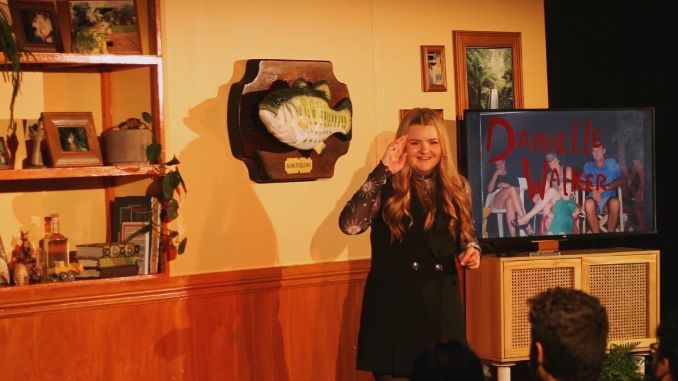You Gotta Laugh: How the Pandemic Has Changed Comedy at the Edinburgh Fringe
Photo by Comedy Republic
In 2019, the Edinburgh Fringe could only fairly and accurately be described as an onslaught. A cacophonous and exhaustive financial burden on everyone involved, bar some very wealthy venue owners and promoters, I remember thinking, as a longtime Edinburgh resident and proud recipient of three consecutive festival burnouts, that we potentially needed a break from the largest arts festival in the world. I’d like to formally apologize, therefore, for inadvertently causing the COVID-19 pandemic.
After being cancelled in 2020, the festival of comedy, theater, music, spoken word, and pretty much everything in between was back in a highly reduced capacity the following year, which featured online shows, smaller names, and modestly budgeted productions. (The fact that I’ve heard industry folk joke that the 2021 edition was a bit pathetic and embarrassing reveals everything about where loyalties are in a festival—not with the homegrown, grassroots art.)
All of the above has been forgotten for the 2022 festival, where artists from around the world are leaping back into the full Fringe fray, eager to move past the last few years and return to their lifeblood. But the pandemic lingers heavily over the Fringe, not just in health anxieties over attending, but in the formation of the shows on offer. Thankfully, we seem to have gotten most of the COVID new writing/student theatre out of the way (“Love in the Time of Corona’’ was a particular low point), but smaller comedians don’t just want to talk about the pandemic—they’re eager to share the new anxieties and difficult introspection it gave them. They’ve found, in returning to performance, that it’s harder to adopt a typical comedic persona, and they don’t want to waste their opportunity for connection.
I saw four acts in the opening days of the Fringe that fit this trend. I wasn’t seeking them out; I knew a couple from comedy podcast appearances, found another from scrolling for cheap tickets, and found the last by being flyered by the performer himself. None of them were packed out (maybe all about half full), but the audiences were warm, and every comic filled the room and elicited a lot of laughter. They also brought with them ruminations on love, purpose, family, and loneliness in a way that never seemed preachy or manipulative.
There’s a lot of discourse floating about on stand-up sets that feel more like therapy, and the Fringe is known for acts that do hard right turns into forced poignancy in the last 10 minutes—a trend that speaks to an unclarity of how personal reflections within 60 minute comedy shows can work. These four acts have nailed that balance, giving unique and honest perspectives on something that’s affected everyone in starkly isolating ways.
Tom Walker, arguably the most well-known of the bunch, is a commanding presence onstage. An incredibly tall, broad man, staring out with wide eyes and immediately covered in sweat, his booming, offbeat delivery and Gaulier-trained clownery are immensely likeable. After taking an incredibly tight mime set from the festival circuit to Amazon Prime, his show Javelin has a much looser feel-especially in the omnishambolic preview performance I saw, the second of his month-long run. “FUCK!” he exclaimed after a sound cue reminded him of a skit he forgot to perform. “Okay, this next bit is called the claustrophobic mime.” But Walker is an audience goodwill generator, and there’s rarely a moment his chaotic silliness, planned or otherwise, doesn’t make you laugh. He also contextualizes his show with his recent recovery from COVID, to which he credits a certain brain-fogginess.
Javelin is structured around a comical story of Walker’s thwarted javelin career, told with earnest poise. As the show progresses, the tale is interrupted not just with mime skits and physical comedy, but with reflections into Walker’s real-life, obsessive brain. A quote from his mother marks the show’s midpoint—“We do not have the tools to deal with the chaos we create by living,”—and it colors the rest of Walker’s set. The javelin story isn’t just there to amuse us; it reveals Walker’s anxieties of not having achievements or talents that define him, despite how eager his brain is to obsess over them. Javelin marks Walker’s urgent desire to reach out after disorientating experiences, ones that helped form the show and now affect its performance.
Danielle Walker (no relation, but also Australian) was a first-time watch for me, but it’s hard to imagine a show more relaxed and more vulnerable than this. Not seeing her family for two years caused a wave of anxiety about losing the ones she loves most, thus she created Nostalgia to get a firmer grip on how cherished her relatives are. Or, she has a hysterically odd family, and decided it was time to share them with the world. Both motives are true, neither more than the other. Nostalgia is an open-ended show that doesn’t demand definition. The laughs mainly come from readings, recordings, and recountings; Walker knows her subjects so well, you can’t imagine a better storyteller of her family’s escapades. She mimics their regional Queensland voices with expert delivery, and even when we’re watching videos or listening to voicemails, she stands to the side mouthing along—it all feels so reflexive and affectionate.
-

-

-

-

-

-

-

-

-

-

-

-

-

-

-

-

-

-

-

-

-

-

-

-

-

-

-

-

-

-

-

-

-

-

-

-

-

-

-

-








































